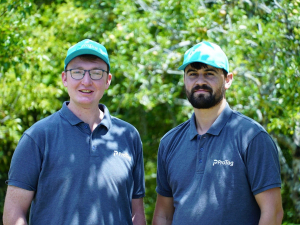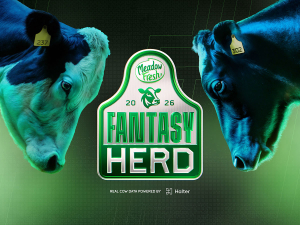Massey University engineering PhD students and entrepreneurs, Tyrel Glass and Baden Parr, say they are creating game-changing technology for the agricultural industry.
Their agri-tech start-up Protag has now raised $1m from investors to fast-track the development of their smart ear tag sensors, which transmit crucial health and location data to dairy farmers within seconds.
Protag’s small internet-enabled device clips onto a cow’s ear, allowing farmers to continuously monitor the animal’s health, grazing and breeding habits.
Machine learning is then used to process data from the device’s temperature, movement, and location sensors, helping farmers map animal behavioural patterns and detect the early onset of illnesses in real time.
The funds were raised from a variety of sponsors including Finistere, OurCrowd, Fonterra, Sprout and Callaghan.
Protag co-founder Tyrel Glass says the company’s small, lightweight device is 100 times more power-efficient than other GPS-based devices using bulkier battery packs.
“We see a future where every farmer has detailed information on the health and wellbeing of every animal. The power of remote sensing in animal health is huge and Protag is the gateway into this data, providing advanced analytics for each animal that can map the whole story of the cow, and at an accessible price point for all farmers,” Glass says.
“Mastitis, lameness (leg and foot pain), and reproduction issues are the main ailments dairy cattle face. By detecting these early, Protag paves the way for more sustainable farming and improved animal welfare,” adds fellow co-founder Baden Parr.
The newly raised funds will be used to accelerate the company’s product development and validation in preparation for large scale trials planned for later this year, with several expressions of interest generated from farmers in Waikato and the South Island.
While the company has its immediate sights on the New Zealand market, where a farmer’s average dairy herd is 440 cows, Ireland and Brazil have been identified as future markets.


















